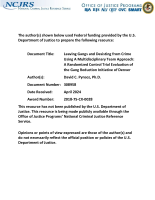Case Management
Assessing a Trauma-Informed Decision Protocol for Juvenile Justice, Final Technical Report
Partnering to Enhance Services for Survivors: An Evaluability Assessment and Formative Evaluation of Safe Horizon's Anti-Trafficking Program
Performance Measurement in a Correctional Program
Domestic Violence and Child Custody Disputes: A Resource Handbook for Judges and Court Managers
Day Reporting Centers as an Intermediate Sanction: Evaluation of Programs Operated by the ATTIC Correctional Services
Crossroads: A Community-Based Outpatient and Alternative-to- Incarceration Program for Women Offenders in New York City
Birmingham Treatment Alternatives to Street Crime (TASC): Meeting Women's Needs Through Coordinated Case Management
Hitchcock Center for Women
Forever Free Substance Abuse Program at the California Institute for Women in Frontera, California
Expedited Drug Case Management Programs: Issues for Program Development, Executive Summary
Managing the Criminal Appeals Process: Three Alternative Approaches
Management of Inmate Violence: A Case Study
Management of Inmate Violence: A Case Study Summary
Improving Outcomes for Child and Youth Victims of Commercial Sexual Exploitation: An Evaluability Assessment of the Love 146 Survivor Care Programs
A Focused Deterrence Program for Juveniles with Firearm Offenses: a Randomized Controlled Trial and Process Evaluation
The relationship between participation in structured activities and health, safety and quality of life outcomes for prison residents and staff
A Statewide Assessment of the Impact of Virtual Check-Ins for Community Supervision
Enhancing Risk-Need-Responsivity Implementation: An Evidence-based System for Case Management Support
Prevention of Financial Abuse Among Elders Affected by Cognitive Decline: A Randomized Controlled Trial in Rural Michigan
Technology Use Among the Nation’s Medical Examiner and Coroner Offices: Data from the 2018 Census of Medical Examiner and Coroner Offices
Expansion of University of South Florida's BRIGHT Project to Combat Human Trafficking
Understanding the Impact of COVID-19 on Victim Services
The COVID-19 pandemic had a detrimental impact on communities across the nation and significantly affected various aspects of individuals’ lives. One of the negative impacts was an increase in gender-based violence accompanied by shifting barriers to accessing services and support. Victims and victim service providers faced various challenges dealing with the increase in need for services, navigating barriers to help-seeking, and addressing logistical issues.
See the YouTube Terms of Service and Google Privacy Policy




